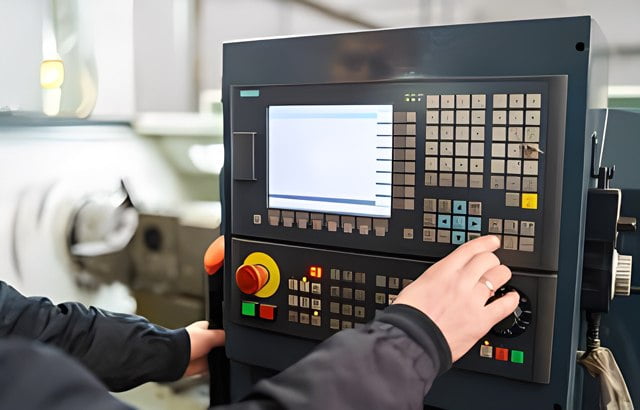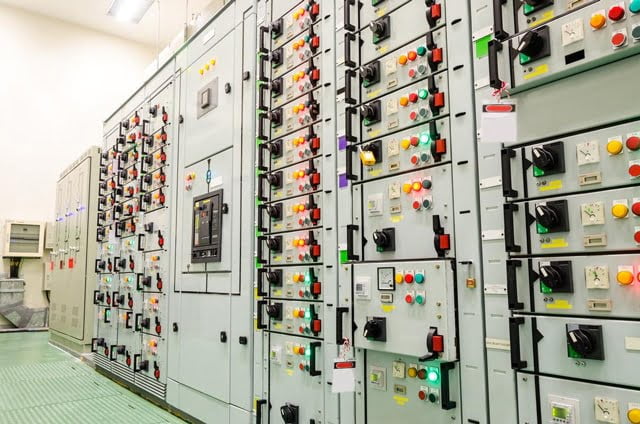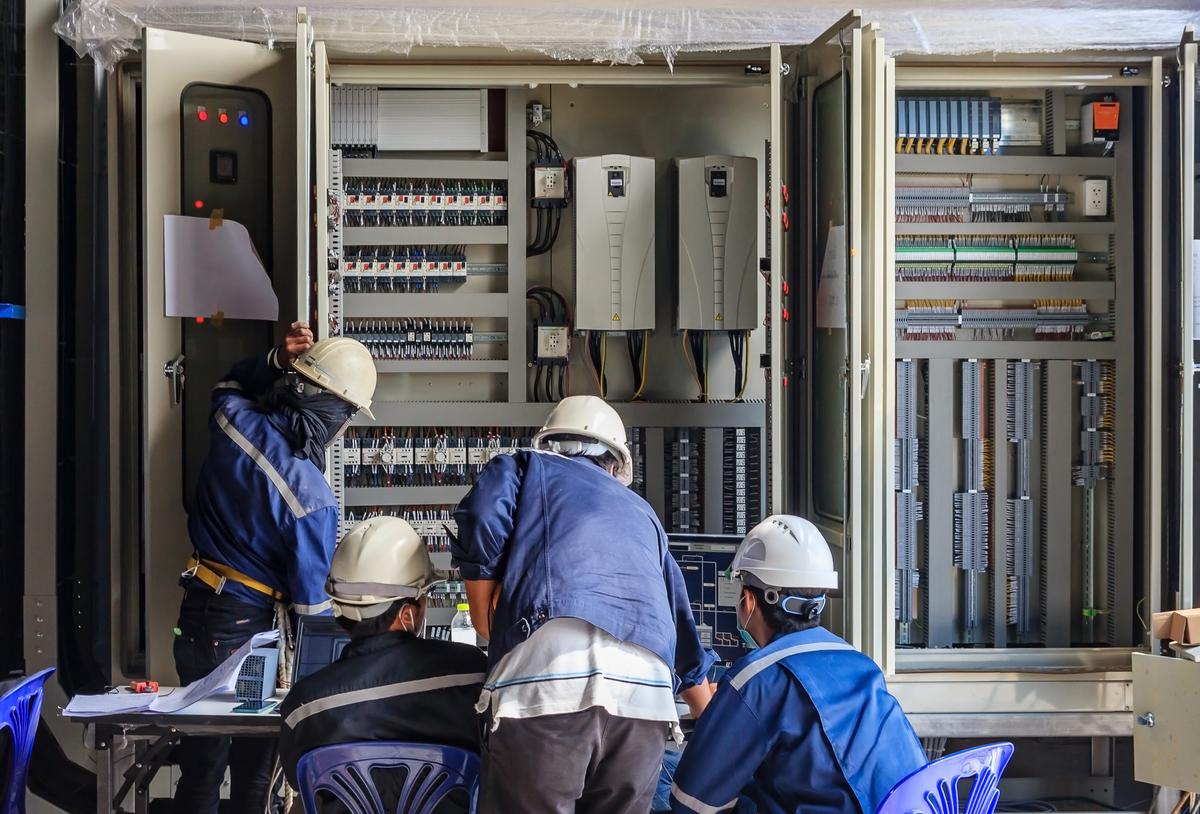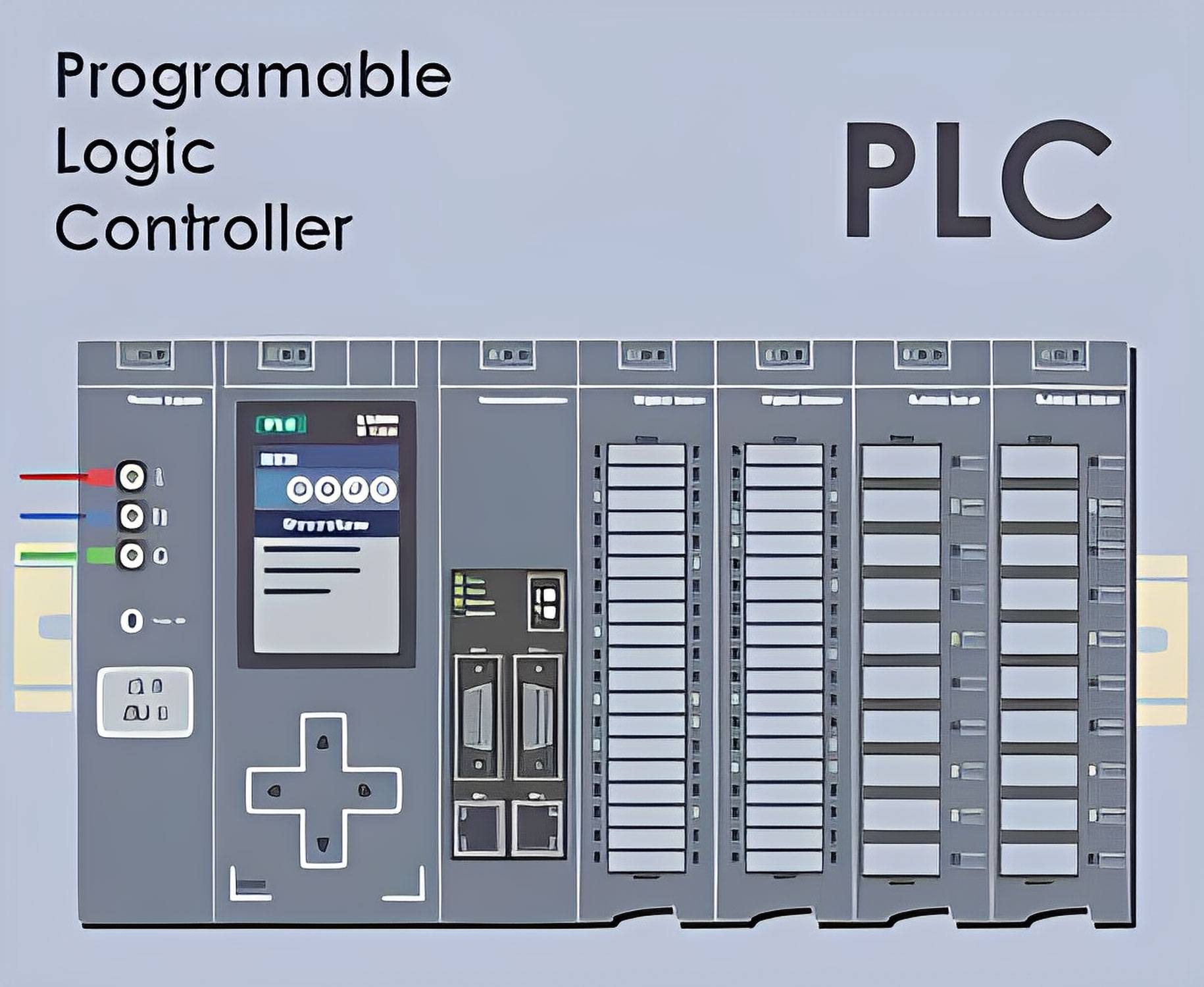Customized Automation Control Panels for Specific Industries
Custom Automation Control Panels are integral components in industrial systems, actively overseeing and regulating automated processes. These panels improve efficiency, simplify functions, and ensure control, helping automated technologies work smoothly in different industries.
Automation control panels are important in industries for precise control and monitoring of industrial processes. These panels are custom-designed to meet the specific needs of different sectors, ensuring optimal performance and efficiency. One of the key technologies used in automation control panels is Programmable Logic Controller (PLC).
PLC tech allows programming and controlling various industrial processes, integrating smoothly with other equipment and systems. With its versatility and reliability, PLC technology has revolutionized the automation industry, allowing for more sophisticated control and enhanced productivity.
In today’s rapidly evolving industrial landscape, customization is becoming increasingly important in automation control panels. Customizing these panels for different industries improves performance and efficiency. It integrates specific features to address challenges in manufacturing, oil and gas, and pharmaceutical sectors. Moreover, customization allows for the seamless integration of automation control panels with existing infrastructure, minimizing disruption and maximizing efficiency.

Overview of Customization in Industrial Automation
Customization is important in industrial automation. It helps companies make automation control panels that meet their needs. Industrial automation uses technologies like PLC and HMI to automate tasks and improve efficiency.
Customization in industrial automation involves integrating HMI systems. This allows operators to easily monitor processes, control parameters, and access real-time data on automation control panels.
This integration simplifies automation systems and improves decision-making for operators. It provides a clear view of industrial processes. Companies can enhance their operations by adding HMI integration to custom control panels, making them more efficient. By adding HMI integration to custom control panels, companies can make their operations more efficient.
Identifying Unique Challenges in Different Industries for Automation Control Panels
Industries across the board are increasingly recognizing the need for customized automation control panels to address their unique challenges. Traditional control solutions often fall short when it comes to meeting the specific requirements of different industries. From oil and gas to pharmaceuticals, each sector faces distinct obstacles that call for tailored automation control solutions.
When it comes to safety, regulations, and old systems, a one-size-fits-all approach is not enough. Custom control panel solutions are needed to overcome these challenges and improve efficiency.
One common challenge that many industries face is the need for automation system upgrade. As technology evolves rapidly, businesses are compelled to keep pace with the latest advancements to stay competitive. However, implementing these upgrades often results in compatibility issues with existing systems. Customized automation control panels help bridge this gap by offering seamless integration with the current infrastructure.
Automation Control Panels Across Industries
Manufacturing Sector
In the manufacturing sector, Automation Control Panels play a pivotal role in orchestrating complex production processes. These panels efficiently manage machinery, monitor output, and ensure quality control, leading to enhanced productivity and reduced downtime.
Energy Industry
Automation Control Panels are used in the energy industry to monitor and control power generation and distribution. They enable real-time monitoring, control voltage levels, and facilitate preventive maintenance, contributing to a more reliable and efficient energy infrastructure.
Pharmaceutical Industry
Automation Control Panels are used in the pharmaceutical industry. They control production processes, ensure accurate medication dosage, follow regulations, and reduce errors in drug manufacturing.
Automation Control Panels are necessary for controlling pumps, valves, and chemical dosing systems in water treatment and wastewater management. They optimize the treatment process, improve efficiency, and ensure compliance with environmental standards, promoting sustainable water management.
Transportation Industry
In transportation, Automation Control Panels manage the movement of goods in warehouses and logistics centers. This makes operations smoother, orders faster, and labor costs lower.
In the healthcare field, Automation Control Panels contribute to the efficient operation of medical equipment, such as diagnostic devices and laboratory instruments. They enhance precision, reduce manual errors, and maintain a controlled environment critical for accurate medical testing and diagnostics.
Automation Control Panels are versatile tools used in various industries. They improve efficiency, accuracy, and reliability in processes. This ultimately leads to higher productivity and better results.
Importance of Tailoring Automation Control Panels to Specific Requirements
Automation control panels play a critical role in enhancing the efficiency and productivity of industrial processes. However, not all industries have the same requirements when it comes to automation control panels. This is where the importance of tailoring these panels to specific requirements comes into play.
One key aspect of customization is the integration of SCADA systems into automation control panels. SCADA (Supervisory Control and Data Acquisition) systems provide real-time monitoring and control capabilities, allowing operators to make informed decisions quickly. By tailoring automation control panels to specific requirements, industries can integrate SCADA systems seamlessly, optimizing their operations and ensuring smooth performance.
Additionally, PLC technology is another essential element that can be customized to meet industry-specific needs. PLCs (Programmable Logic Controllers) are the brains behind automation control panels, controlling various processes and equipment. By tailoring automation control panels to specific requirements, industries can incorporate advanced PLC technology, enabling them to handle complex tasks effectively and efficiently.
Challenges Faced in Manufacturing Processes
Challenges in manufacturing processes can vary greatly depending on the industry and specific requirements. These challenges may include complex assembly lines, intricate machinery, and the need for stringent quality control. In order to overcome these challenges, customized automation control panels come into play. Control panels are designed to cater to the unique needs of each manufacturing process, providing tailored solutions for enhanced efficiency and productivity.
One key component of these customized control systems is the integration of PLC and HMI innovations. PLC tech controls manufacturing process in real-time, ensuring top performance and reducing errors.
HMI advancements simplify operator interaction with the control panel. This allows operators to monitor and adjust the manufacturing process more easily.
• Custom automation panels are made for specific manufacturing processes to meet their unique requirements.
• They provide tailored solutions for enhanced efficiency and productivity
• Integration of PLC and HMI innovations is a key component of these control systems
• PLC technology allows for precise and real-time control of the manufacturing process, reducing the risk of errors
• HMI advancements provide intuitive and user-friendly interfaces for operators to interact with the control panel
• Incorporating advanced technologies into customized automation control panels leads to higher quality output and improved overall performance.
Key Considerations in Customization Automation Control Panels
When it comes to customizing automation control panels, there are key considerations that should not be overlooked. One of these considerations is the integration of wireless communication. With the advancement of technology, the ability for automation control panels to communicate wirelessly has become increasingly important.
This allows for greater flexibility and accessibility in monitoring and controlling the industrial processes. By combining wireless communication with automation control panels, industries can gain real-time data transmission, increased efficiency, and less downtime.
Another key consideration in customization is the implementation of SCADA systems for enhanced monitoring and control. SCADA is a strong tool for monitoring and controlling industrial processes from a central location. By incorporating SCADA systems into automation control panels, industries can gain real-time visibility into their operations, analyse data trends, and make informed decisions.
SCADA systems improve automation control panels by monitoring parameters, detecting issues, and taking necessary actions, resulting in better performance and productivity.
Integration with Existing Infrastructure Automation Control Panels
To effectively integrate automation control panels with existing infrastructure, it is crucial to consider the compatibility and seamless connectivity of the various components. The VFD panel is important for controlling motor speed and energy efficiency in industrial processes. This integration enables the system to efficiently adjust motor speed as required, optimizing productivity and reducing energy consumption.
The PLC panel is an important part of the automation system and acts as its brain. This compatibility allows for smooth data exchange and communication between the PLC and other devices. These devices include sensors and actuators. It is used for efficient control and automation of industrial processes.
By connecting the PLC panel to current infrastructure, operators can use advanced diagnostics and remote access. This helps with quick problem-solving and maintenance, reducing downtime and improving system performance.
Advancements in Technology
Advancements in technology have revolutionized the field of customization in automation control panels. One notable innovation is the development of Programmable Logic Controllers (PLCs) and Human-Machine Interfaces (HMIs). PLCs offer a flexible and efficient solution for controlling and monitoring industrial processes, allowing for precise customization according to specific requirements.
Moreover, the integration of wireless communication technologies has further enhanced the capabilities of automation control panels. With wireless communication, real-time data exchange between various components within industrial processes becomes convenient and reliable. This technology eliminates the need for extensive wiring, making the system more flexible and cost-effective. Additionally, the implementation of Supervisory Control and Data Acquisition (SCADA) systems has revolutionized monitoring and control in automation.
SCADA systems enable operators to remotely monitor and regulate the system, ensuring optimal performance and preventing any potential issues. With better monitoring, operators can quickly find and fix any problems or inefficiencies in manufacturing, resulting in improved efficiency and productivity.
Best Practices in Designing Customized Automation Control Panels
Designing customized automation control panels requires careful planning and execution to ensure optimal performance and efficiency. One best practice is to conduct a thorough analysis of the specific requirements and challenges faced by the industry or manufacturing process.
To solve these problems, important parts and features need to be identified. These include improved PLC and HMI technology, wireless communication integration, and SCADA systems for better monitoring and control. Designers can customize automation control panels to meet specific needs and achieve better quality output.
Another best practice is to consider the integration of the customized automation control panels with the existing infrastructure. This involves compatibility with the existing equipment, networking systems, and software applications. This also reduces the risk of compatibility issues and ensures a smooth transition to the customized automation control panels.



